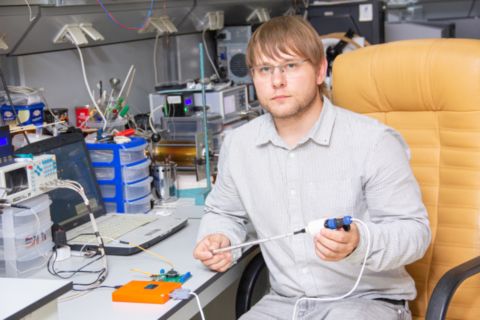Within the framework of the Priority 2030 program under the Science and Universities national project, a team of scientists led by Vladimir Zhivulin, Candidate of Sciences (Physics and Mathematics), Senior Research Fellow at the Crystal Growth Laboratory of the Research Institute of Non-conventional Materials and Resource-Saving Technology, developed a unique product – a self-calibrating temperature sensor based on ferrite elements.
The sensor's special value is that it guarantees high accuracy of readings during long-term operation and does not require constant verification, as it has a built-in automatic self-diagnostic function. The developed device is capable of checking how accurately the temperature readings are recorded at each heating and cooling cycle. The unique design of the measuring part of the sensor has been patented.
The device being developed includes a measuring part and a software and hardware complex that is capable of receiving signals and processing them correctly. At the moment, the technology and design of the measuring part of the sensor have been processed. This year, scientists have a task of refining the electronic control unit of the sensor and, most importantly, developing an automatic calibration algorithm.
Today, the task of automatic diagnostics of temperature sensors has been solved, but the task of automatic self-calibration is far more complicated. A successful solution to this problem will make SUSU a world leader in the creation of intelligent measuring devices.
A large industrial enterprise, which is engaged in the production of sensors for industry, as well as enterprises engaged in the nuclear industry, was interested in the scientists' development. The use of a self-diagnostic temperature sensor in the nuclear industry will reduce the amount of radioactive waste, thus making the industry more environment-friendly and safer.
Thanks to funding under the Priority 2030 program, it was possible to unite specialists from various fields, such as materials science, electronics, metrology, and create a unique product that has no analogues in the world.
The project is being implemented within the framework of the Priority 2030 program under the Science and Universities national project.




